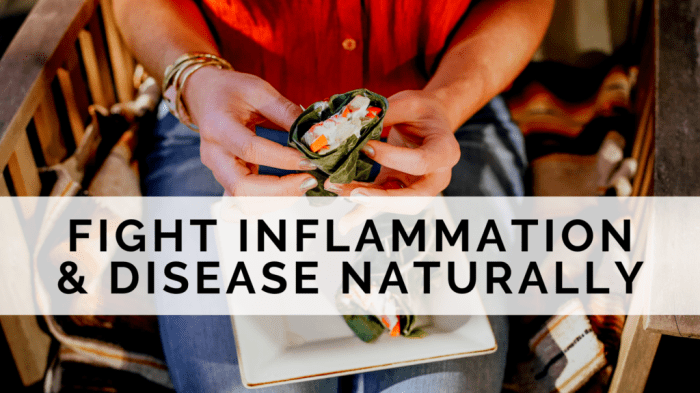Diving into the realm of Natural and Holistic Approaches to Inflammatory Diseases, this introduction sets the stage for a fascinating exploration of methods to combat inflammation in the body. With a blend of informative insights and practical tips, readers are invited to discover a holistic approach to managing inflammatory conditions.
In the following paragraphs, we will delve deeper into the various strategies and techniques that can help individuals deal with inflammatory diseases in a natural and holistic way.
Overview of Inflammatory Diseases
Inflammatory diseases are conditions in which the body's immune system triggers an inflammatory response even when there is no threat present. This inflammation can cause damage to tissues and organs, leading to various symptoms and health issues.
Types of Inflammatory Diseases
- Rheumatoid Arthritis: An autoimmune disorder that primarily affects the joints, causing pain, swelling, and stiffness.
- Crohn's Disease: A type of inflammatory bowel disease that leads to inflammation in the digestive tract, resulting in abdominal pain, diarrhea, and weight loss.
- Psoriasis: A chronic skin condition characterized by red, scaly patches on the skin due to inflammation.
- Asthma: A respiratory condition that involves inflammation and narrowing of the airways, leading to breathing difficulties.
Common Inflammatory Diseases and Symptoms
- Arthritis: Joint pain, swelling, and stiffness.
- Ulcerative Colitis: Abdominal pain, bloody diarrhea, and fatigue.
- Lupus: Joint pain, fatigue, and skin rashes.
- Multiple Sclerosis: Muscle weakness, vision problems, and fatigue.
Natural Approaches to Treating Inflammatory Diseases
When it comes to managing inflammation, natural remedies can offer a gentle yet effective approach that focuses on supporting the body's own healing processes. These methods are often preferred by individuals looking to reduce inflammation without the potential side effects of pharmaceutical drugs.
Herbs and Supplements for Inflammation
Herbs and supplements are known for their anti-inflammatory properties and can be a great addition to a holistic approach to treating inflammatory diseases. Some commonly used herbs and supplements include:
- Turmeric: Contains curcumin, a compound with powerful anti-inflammatory effects.
- Ginger: Known for its anti-inflammatory and antioxidant properties.
- Fish oil: Rich in omega-3 fatty acids, which have been shown to reduce inflammation in the body.
- Boswellia: Derived from the Boswellia tree, it has been used in traditional medicine for its anti-inflammatory properties.
Anti-Inflammatory Foods
Along with herbs and supplements, incorporating anti-inflammatory foods into your diet can help reduce inflammation naturally. Some examples of anti-inflammatory foods include:
- Leafy greens: Spinach, kale, and other leafy greens are rich in antioxidants that can help combat inflammation.
- Berries: Blueberries, strawberries, and other berries are packed with antioxidants and have anti-inflammatory properties.
- Fatty fish: Salmon, mackerel, and sardines are high in omega-3 fatty acids, which can help reduce inflammation.
- Nuts and seeds: Almonds, walnuts, and chia seeds are good sources of healthy fats and antioxidants.
Lifestyle Changes for Reducing Inflammation
Aside from incorporating herbs, supplements, and anti-inflammatory foods into your routine, making certain lifestyle changes can also help reduce inflammation naturally. Some examples of lifestyle changes include:
- Regular exercise: Physical activity can help reduce inflammation and improve overall health.
- Stress management: Practices like yoga, meditation, and deep breathing can help lower stress levels, which in turn can reduce inflammation.
- Quality sleep: Getting enough restful sleep is essential for the body to repair and recover, reducing inflammation in the process.
- Hydration: Staying hydrated by drinking enough water can help flush out toxins and reduce inflammation in the body.
Holistic Healing Methods for Inflammatory Diseases
Holistic healing focuses on treating the whole person, including the physical, mental, emotional, and spiritual aspects. When it comes to inflammatory diseases, this approach aims to address not just the symptoms but the underlying causes of inflammation to promote overall well-being.
Acupuncture for Managing Inflammation
Acupuncture is a traditional Chinese medicine practice that involves inserting thin needles into specific points on the body. This technique is believed to help restore the flow of energy and balance in the body, which can alleviate inflammation and reduce pain associated with inflammatory conditions.
Yoga for Inflammation Management
Yoga combines physical postures, breathing exercises, and meditation to improve flexibility, strength, and mental clarity. Practicing yoga regularly can help reduce stress, which is known to exacerbate inflammation in the body. Additionally, certain yoga poses can target specific areas of inflammation and promote healing.
Meditation for Emotional Well-being and Inflammation
Meditation is a practice that involves focusing the mind and cultivating awareness. It has been shown to reduce stress, anxiety, and depression, all of which can contribute to inflammatory conditions. By promoting emotional well-being, meditation can help lower inflammation levels in the body and improve overall health.
Dietary Strategies for Reducing Inflammation

When it comes to reducing inflammation in the body, adopting a holistic diet plan can play a crucial role in managing inflammatory diseases. By focusing on whole foods and incorporating specific nutrients, such as omega-3 fatty acids, you can help combat inflammation and promote overall health.
Processed Foods vs Whole Foods
Processed foods are often high in unhealthy fats, sugars, and additives that can contribute to inflammation in the body. In contrast, whole foods, such as fruits, vegetables, whole grains, and lean proteins, are rich in antioxidants and anti-inflammatory compounds that can help reduce inflammation.
Role of Omega-3 Fatty Acids
Omega-3 fatty acids, found in fatty fish like salmon, mackerel, and sardines, have been shown to have anti-inflammatory properties. By including these foods in your diet, you can help decrease inflammation and support overall well-being. Additionally, plant-based sources of omega-3s, like flaxseeds, chia seeds, and walnuts, can also be beneficial in reducing inflammation.
Closing Notes
In conclusion, the discussion on Natural and Holistic Approaches to Inflammatory Diseases sheds light on the importance of considering alternative methods for addressing inflammation. By embracing a comprehensive approach that encompasses lifestyle changes, dietary adjustments, and holistic healing practices, individuals can work towards achieving better overall health and well-being.
Question Bank
How effective are natural remedies in managing inflammatory diseases?
Natural remedies can be highly effective in managing inflammatory diseases by reducing inflammation and supporting overall health. However, it's essential to consult with a healthcare professional before incorporating any new treatments.
What lifestyle changes can help reduce inflammation naturally?
Lifestyle changes such as regular exercise, stress management techniques, adequate sleep, and a balanced diet rich in anti-inflammatory foods can help reduce inflammation naturally.
How does holistic healing impact mental health in inflammatory diseases?
Holistic healing approaches like yoga, acupuncture, and meditation can positively impact mental health by reducing stress, anxiety, and improving overall emotional well-being, which in turn can help manage inflammatory conditions.









